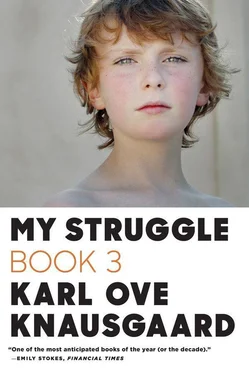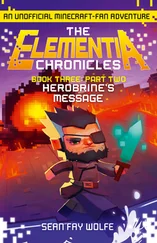“Haven’t they got any manners?” he said. “We’re sitting here eating and he’s intruding.”
“It doesn’t matter,” Mom said. “It’s beautiful here.”
“It was beautiful here,” Dad said. “Until that fathead came.”
“He can hear you,” Mom said.
The man put a clinking cooler bag down beside the table. The woman went over to him.
“They’re Germans,” Dad said. “They don’t understand. We can say whatever we like.”
He took a last swig from his cup and jumped to his feet.
“Well, we’d better be moving on.”
“The boys haven’t finished eating yet,” Mom said. “We’re not in such a hurry, are we?”
“In fact, we are,” Dad said. “Eat up, come on. Be quick about it.”
He flicked his half-smoked cigarette to the ground, took the glasses and cups to the lake, rinsed them and put them in the bag with the plates and thermos. Zipped up the top of the cooler bag and put everything in the trunk. The man and woman said something I didn’t understand as they stared up the gentle slope on the other side of the lake. He was pointing. Something was moving in the distance. Mom scrunched up the wax paper from the smørbrød , put them in a bag, and got up.
“Let’s go then,” she said. “We’ll have to eat the cookies the next time we stop.”
That was what I had feared.
Dad pushed the seat forward for me and I got in. After the fresh air outside, the smell of smoke inside hit you. Yngve clambered in through the other door. He wrinkled his nose.
“I don’t think the car-sickness tablets are working anymore,” he said.
“Say if you feel sick,” Mom said.
“It would help if you didn’t smoke all the time,” he said.
“That’s enough of that,” Dad said. “Don’t whine. We’re on holiday.”
Slowly the car pulled out onto the road. I glanced across, past the lake, up to the spot where the man had been pointing. There was something there. A gray patch in all the green, moving slowly. What on earth could it be?
I nudged Yngve and pointed through the window when I had his attention.
“What’s that?” I said.
“Reindeer maybe,” he said. “We saw them last year, too. Don’t you remember?”
“Oh yes,” I said. “But they were much closer. These ones are so small they’re like mice!”
Then we sank into the trancelike state car travel can induce. We crossed the rest of the mountain range, descended into Røldal, and drove on to Odda, the dirty little town at the end of Hardangerfjord, which despite its run-down, polluted appearance still shared some of the magic the far end of the mountains evoked, so dizzyingly and, at bottom, incomprehensibly different from the world we had left only a few hours earlier. While Sørland for the most part consisted of low crags and knolls, small bedraggled forests with a wide-ranging selection of trees standing side by side in countryside that was both wide open and restricted, and while on the island where I lived the tallest mountain was no more than 120 meters high, this countryside here, which you always stumbled on, was remarkable for its immense mountains, so dominating in their purity and simplicity that all other details of the surroundings were forced to adjust to them, they disappeared, utterly and completely: who cared about a birch tree, however tall, when it stood beneath one of these endlessly beautiful and eternally immutable mountains? The most conspicuous difference, however, was not the dimensions but the colors, which seemed deeper here — nowhere is the color green so deep as in Vestland — or so clear — even the sky, even its blue was deeper and clearer than the blue of the sky where I came from. The sides of the valley were green and cultivated, in the spring and early summer the blossoming fruit trees a Japanese white, the mountain peaks a hazy blue, snow-tipped here and there, and, oh, between the ridges, which rose in a long line on both sides, lay the fjord itself, greenish in some places, bluish in others, gleaming in the sun everywhere, as deep as the mountains were high.
To travel in a car through this landscape was always overwhelming because nothing of what you had seen so far prepared you for what was waiting here. And then, as we drove along the northern side of the fjord, all the other unfamiliar features appeared, like the electric fences, like the red barns, like the old, white timber houses, like the cows grazing, like the long rows of hay-drying racks scattered across the sides of the valley. Tractors, forage harvesters, manure cellars, long brown boots on doorsteps, shady farmyard trees, horses, shops in the basements of normal houses. Children selling wild cherries or strawberries from small stands with handwritten signs along the road. Life here was different from life at home: I could see a stooped old woman wearing a flowery dress and a neckerchief, you didn’t see that where I came from, or a stooped old man in blue overalls and a black peaked cap in some field or along some gravel track. But however much of an impression the places here made on me, the unusual names they bore played a part, of course — Tyssedal, Espe, Hovland, Sekse, Børve, Opedal, Ullensvang, Lofthus, and Kinsarvik, which because of the strange sound was my favorite: all right, vik was an inlet, but a kinsar, what on earth was that ? — and however bright the colors and however different the myriad of details, an atmosphere of extravagance also hung over these regions, not over the people and their activities but over the space they moved in, it seemed much too big for them, perhaps it was the flood of sunlight that did it, perhaps the blueness of the vast sky or perhaps the range of mountains stretching up into it, or else it was simply the fact that we were only passing through, we didn’t stop anywhere, apart from at the bus shelter where Yngve staggered out to throw up, we didn’t know anyone here and were in no way connected with what we saw. For when we did finally reach Kinsarvik and left the car, which Dad had parked in the queue, this sense of extravagance was no longer noticeable; on the contrary, everything seemed nice and cozy here with the sound of car radios, doors being opened and closed, people stretching, walking to and fro, children quietly kicking a ball about next to the queue or doing what Yngve and I were doing, walking to the kiosk at the end to see whether there was anything we could spend some of our holiday money on.
An ice cream?
Oh yes.
Yngve bought an ice cream in a boat-shaped wafer, I bought a tub with a little red spatula and we ambled over to the quay with them in our hands. We sat on a brick wall and looked down at the water and the seaweed lying in wet, greasy clusters against the rocks. In the distance we saw the ferry arriving. The air smelled of salty water, seaweed, grass, and exhaust fumes, and the sun burned our faces.
“Are you still feeling sick?” I said.
He shook his head.
“Too bad we forgot the soccer ball,” he said. “But they’ve probably got one in Våjen.”
He said Våjen the way Grandma did.
“Yes,” I said, squinting into the sun. “Do you think we’ll get on this one?”
“Don’t know. Hope so.”
I dangled my legs. Loosened a big chunk with the spatula and put it in my mouth. It was so big and cold that I had to jiggle it to and fro with my tongue to prevent the icy texture from becoming intolerable. While doing this, I turned and glanced at our car. Dad was sitting with the door open and one leg on the ground, smoking. The sun glinted on his sunglasses. Mom was standing beside him with a basket of wild cherries on the roof and helping herself every now and then.
“What shall we do tomorrow?” I said.
Читать дальше












